- Latest articles
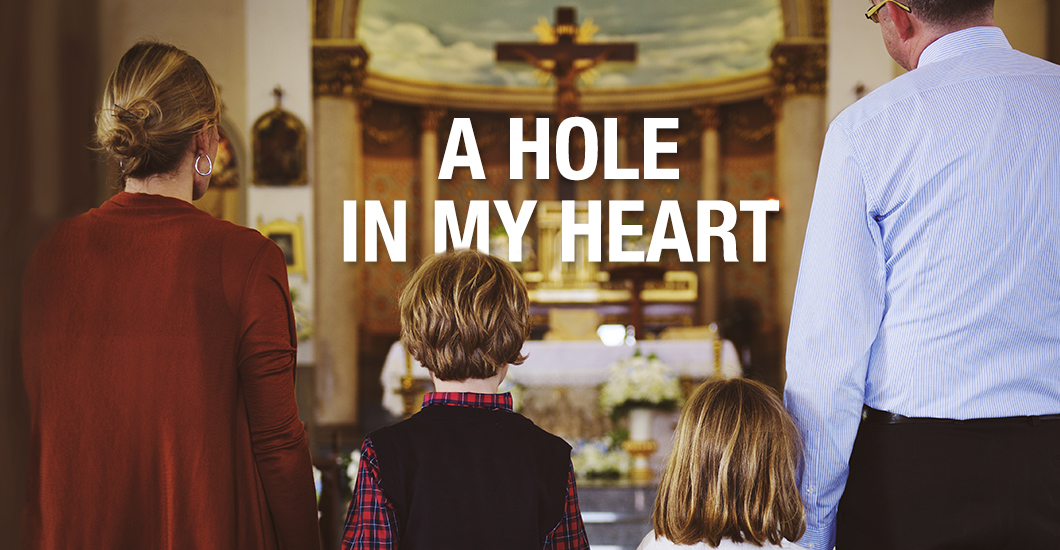
“I grew up in India in the Episcopal Church. My mother read to us from the big Marathi Bible and my earliest memories are of me in love with Jesus. I would sit only on one half of the chair, reserving the other half for Jesus, owing to which I often fell off of my chair. When I started schooling at Saint Joseph’s Convent school, I wanted to become a nun.”
Best Friend Turned Stranger
But as I grew older, and became aware of the suffering around me, I could not understand how a loving God could permit such pain. “Do something,” I would pray. But my prayers went unanswered. By the time I was twelve, I stopped making space for Jesus in my chair, and in my heart. I quit talking to him. I decided he did not care enough. And I cried and cried because I had lost my best Friend. A couple of years later, when I was fourteen, we moved to the U.S. We joined the Episcopal community. I went to church, but only to please my mother and to sing in the choir. My mother died shortly after I had turned twenty two and I no longer had the desire to go. I did not want to pretend to love Jesus when I felt so lonely. I had to take care of myself, become independent and self-sufficient, because I had no one to rely on anymore. I filled my heart with my studies and work, friends and lovers, music and dance, without realizing how hard- hearted I was becoming. I called myself an atheist.
For many years I was a research scientist. I got married to my college sweetheart, Michael. Together we had two children, Max and Dagny. I quit working to stay at home and raise them. I still stepped into a church once in a while—for weddings and funerals. I craved for some sign that Jesus cared. But nothing special ever happened. Life went on as usual.
The children started growing and once they started school, Michael and I wondered how to counteract the permissive culture, short of homeschooling them. We had parental authority, but nothing higher than that. Had we made a grave mistake in not introducing them to God? What right did we have to deny them this fundamental knowledge? It is one thing to know of God and reject Him as I did. That is free will. But what about not even having the opportunity? I would not forgive myself if that emptiness got filled with other things—evil things. It is real and present. I wanted to arm my children with something real and tangible to fight evil, the true cause of suffering.
Return to First Love
I wanted my children to have what I had as a child—love in Christ. Even if He was just a fairytale, I could not deny the power He had had over me and the effects—complete trust that all will be well, a security that was completely irrational given the state of the world, and a certain resilience that was also unearthly. I did not know that what I had possessed was a peace that passed all understanding.
Softening of Heart
In 2006 as a Christmas gift for my kids, I purchased a children’s Bible with beautiful pictures and historical references. Michael, who had not been raised in a religious environment, offered to read. He spent almost a year reading Bible stories to the children and was amazed and delighted with them.
Yet we felt like hypocrites because as much as we wanted our children to have religious instruction, we did not believe. So the conversation turned to going to church. But to which one would we go?
The number of denominations seemed to have mushroomed since I was a child. There was a gathering of non-denominational Christians that met in the school cafeteria but it seemed so casual. I knew that when two or three are gathered in His name, He is present, but we wanted a sense of the sacred, something transcendent.
When I looked to the Episcopal Church, it was nothing like the one in India or even the Episcopal Church we had attended when we first moved to the U.S. When I looked at other churches, I realized that they had some sort of doctrinal dispute with the Catholic Church. The answer was quite obvious—we needed the Church that Christ established.
The following October we stepped into Saint Jude Catholic Church. I wept all through liturgy. My children worried for me. I whispered to them I was happy to be finally home. After the Holy Mass, I tried to enroll the kids in Sunday school, but the lady in charge asked about their ages (7 and 9 years old) and if they had been baptized. When I said, “Never,” she told me I needed to speak to the deacon about RCIA—Rite of Christian Initiation for Adults.
Although I was annoyed by what I thought were hoops we had to jump through, I quickly realized that RCIA is designed so that one may make an informed decision. We began the long process of studying and questioning. Sunday mornings, Michael and I would be dismissed after the homily to ponder the Gospel while the children sat with our sponsors for the Canon of the Mass.
After the Mass, we would have our instruction in the faith with our sponsors. I will always be grateful to the Knights of Columbus for watching over our children. After a few hours at home, we would return for evening Mass and the children’s religious instruction. Perhaps our family needed a double dose of the Word to take root. But I will always be grateful for how our Sundays automatically became holy days.
A New Creation!
We questioned so many things—the teaching on marriage and sexuality, the Eucharist, on life. I reversed every belief I held that went against the tenets of the faith. I did so willingly even when I did not understand everything because I looked to Mary as an example, who did not argue with the angel at the Annunciation, but gave her Fiat. Paradoxically, everything held together beautifully, even the Mysteries of the faith.
I wonder now if it was due to the powerful prayers at the Rite of Acceptance, when our foreheads were crossed with the following words: “Receive this sign of the cross on your forehead. It is Christ Himself who strengthens you now with His love. Learn to know and follow Him.” After that, the priest said the following words as my sponsor made the sign of the cross over my ears, eyes, lips, etc.
“Receive the sign of the cross on your ears, that you may hear the voice of the Lord.
“Receive the sign of the cross on your eyes, that you may see the glory of God. “Receive the sign of the cross on your lips that you may respond to the word of God.
“Receive the sign of the cross over your heart that Christ may dwell there by faith.
“Receive the sign of the cross on your shoulders, that you may bear the gentle yoke of Christ.
“Receive the sign of the cross on your hands, that Christ may be known in the work which you do.
“Receive the sign of the cross on your feet that you may walk in the way of Christ.” I wept. These words and the sensation of having my hands and yes, even my feet blessed, were overwhelming. I had fallen in love with Jesus all over again. That Christmas was meaningful when we sang “O come, let us adore Him, Christ the Lord”. During the Lent, while meditating on the sorrowful passion of Jesus, I felt unworthy. I knew I deserved death, not life. But Jesus drew me to Himself and showered all His tender mercies upon me. I wanted nothing more than to be in the shelter of His Cross, to be washed clean in His Blood. On Easter Vigil—April 11, 2009—a date as important as the ones when I got married and gave birth to my two children, I watched Michael, Max and Dagny, getting baptized. My heart was full;, I felt as if I were giving these three loves of mine to Jesus, my first love. Then together, we made a profession of faith and received the Body and Precious Blood of our dear Lord Jesus. Week by week, the God-shaped hole in my heart began to fill. I no longer fall out of chairs, but I am whole again.
'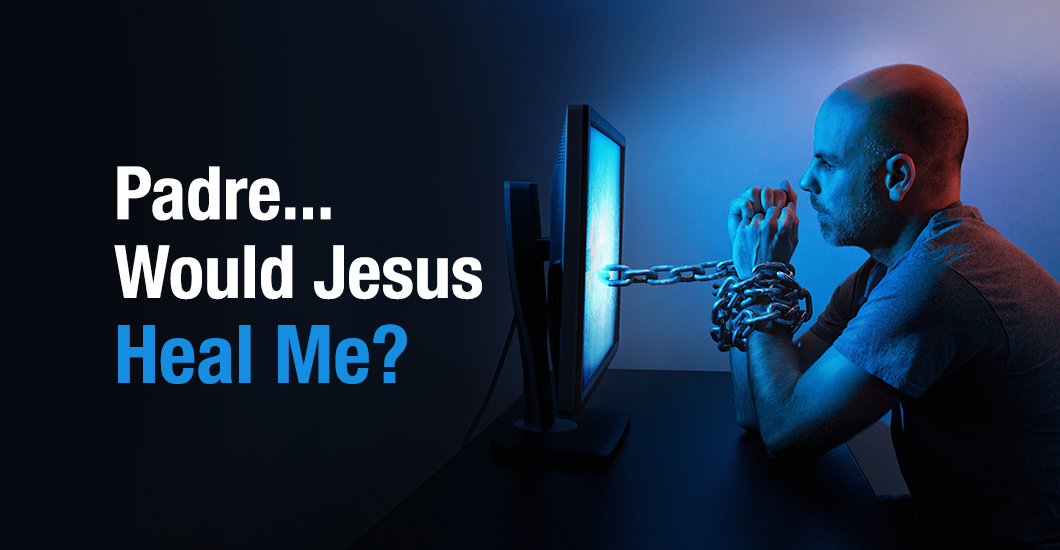
Looking for a way out of those menacing addictions? Worried about relapsing into your old habits? Here is the answer!
On a solemn evening after the culmination of the three-day Shalom retreat, I was observing the happy faces going back to their homes, renewed in spirit. My heart rejoiced in gratitude and then I heard a voice from behind, “Padre, would Jesus heal me?” This question caught my attention and I recognized the young man in his twenties, standing beside me. He looked perplexed. While everyone was getting ready to leave, this young man stood in hesitation as if he was in dire need of answers to all the questions that still loomed his mind: “Will I be able to lead a life of holiness? Will I fall back again into my old habits?”
From the first day of the retreat itself, I came to know that this young lad had lost everything: family, friends and relationship, due to his addiction to pornography. It knit him into a toxic relationship, a life that was totally messed up and devastated. It seemed as if he had lost all hope. Such was his plight that he was unable to look at anyone with good intention, not even his parents. His whole life had turned filthy and his mind was drenched with guilt. Though he had tried many alternate methods to break this bondage of addiction, nothing worked and he fell back into the same sin over and over again.
Is Anything Impossible for God?
As Saint Augustine said, “There is no saint without a past and no sinner without a future.” The young man recollected that it was during confession, the mercy of the Lord touched his heart. This gave him a deep realization of how important it is to depend, like a child, on God. In fact, his continuing anxiety about the future revealed his hunger to pursue a life of holiness. I was reminded of what Saint Francis de Sales used to say: “The Lord delights in every little step you take to lead a Holy life.” I urged this young man to “Keep on trying!” The key to growing in conversion is to keep on trying, even if you do not see an apparent result. God sees your efforts. The inability to see our own progress helps us to depend more on God.
Conversion happens in a moment but it needs an entire lifetime to be complete. The Bible shows us three important milestones to remain in holiness:
1. It all begins with desire.
What are you looking for? Like a fuel that leads to ignition, it is the desire that drives us into action. A google search history of an individual would reveal that person’s interests and secret desires. “For where your treasure is, there also will your heart be” (Matthew 6:21).
In Maria Valtorta’s “The poem of Man-God,” there is a narration about a group of people standing around Jesus and asking Him “Why have you never sinned in your life?” Jesus’ reply is simple: “I have never desired sin.” The first step to being holy is to desire purity, because desire leads to effort. Apostle Paul had gone through the same war on desires: “Thus I do not run aimlessly; I do not fight as if I were shadowboxing. No, I drive my body and train it for fear that, after having preached to others, I myself should be disqualified” (1 Corinthians 9:27).
Desire controls our steps; we need to shun away certain desires while others need to be cultivated. Very often those unfulfilled desires lead to addiction. In order to pursue a holy life, one must cultivate the desire for holiness. Cultivating Godly desires helps the soul focus on God. As Saint Augustine said, “The entire life of a good Christian is, in fact, an exercise of Holy desire. You do not yet see what you long for, but the very act of desiring prepares you, so that when He comes, you may see and be utterly satisfied.”
2. Flee or fall?
Very often we are the result of the environment in which we live. Context and circumstances exert a great influence on our actions. The change in a situation can make a lot of difference. To live in a holy atmosphere and context is invariable to lead a holy life.
Every human being has a natural inclination to do what is forbidden. Apostle Paul makes it clear in Romans 7:23: “But I see in my members another principle at war with the law of my mind, taking me captive to the law of the sin that dwells in my members.” The life of Holiness is one of the battles; each and every moment, there is a battle between flesh and soul, and the conducive context produces corrupt desires of the flesh.
Saint Bernadine of Sienna teaches us that the best of all counsel is to avoid the occasion of sin, and this indeed forms the foundation of holiness. “Be sober and vigilant. Your opponent, the devil, is prowling around like a roaring lion looking for someone to devour” (1 Peter 5:8). Evil comes disguised, often in the form of our weakness. Saint Philip says that in the battle against impurity, the victory will be for the one who flees away from the occasion of sin, not the one who exposes himself to it and harms his flesh, making it impossible for him to resist the attacks.
3. Take heart!
Trusting and relying on the mercy of the Lord is the easiest way to advance in holiness. God is not a judgmental figure waiting to make things complicated. He is our Father, abounding in mercy, waiting to embrace anyone who comes before the throne of mercy. Trusting in ourselves and relying on our effort alone is a sure way to be lost, but by trusting in God we can do all things. Little shortcomings may come our way but they are only meant to humble us. “I am love and mercy itself. There is no misery that could be a match for My mercy, neither will misery exhaust it, because as it is being granted—it increases. The soul that trusts in My mercy is most fortunate, because I Myself take care of it” (From “Divine Mercy in My Soul: Diary of Saint Maria Faustina Kowalska” 1273). Mercy of Jesus is an invitation for us to totally abandon ourselves to His will. What is impossible for man is possible through the mercy of the Lord.
Cue Point
Peter was a liar; Mary Magdalene was a party girl; Mary of Egypt was a prostitute; Paul was a persecutor; Augustine was a wayward son; but they all became Saints by journeying through the path of holiness!
Always remember that His grace is sufficient for you… and now is the time to rise again and continue. Desire holiness, make a bold decision to keep away from all occasions of sin and just trust in His mercy!
Prayer
“O Lord, instill in our hearts a strong desire for holiness so that, empowered by the Holy Spirit, we may keep away from sin. With great confidence, we come to Your fount of mercy, entrusting ourselves into Your loving arms. Amen.
'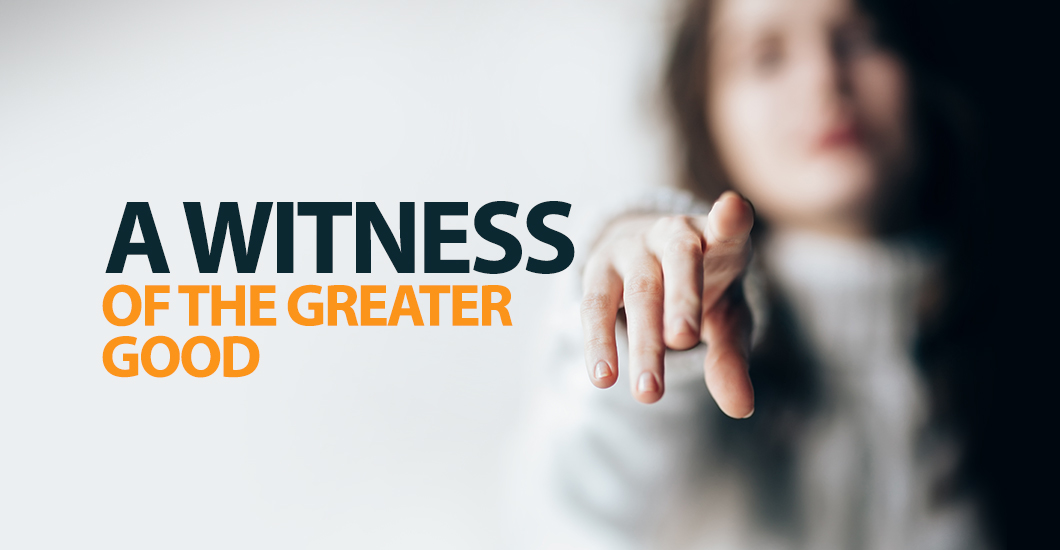
At the age of fourteen, Rosario Rodriguez was innocently unaware that she had become one of many young women to be stalked by a serial rapist and murderer. According to police, the suspect would choose and follow his victim for months near local high schools before he attacked. Rosario was abducted on her way to the bus stop and she was dragged into a wooded area.
The attacker attempted to rape Rosario as he firmly pressed his hand against her mouth. Rosario screamed the words of the Hail Mary as he fought to break her and silence her forever. In a 2011 interview with Tony Rossi, host and producer of Christopher Closeup, Rosario recalled, “His eyes got really big. He looked afraid, jumped up and ran away. My first reaction was to turn around to see what he saw, but I saw nothing … We have always had guesses [that he saw] Saint Michael or my guardian angel or our Lady because I was screaming the Hail Mary. But I believe he saw something divine.”
Rosario was the first and only victim to have escaped the clutches of this man with her life and without physical injury. Rosario was raised in a loving family with a vibrant Catholic faith. For five years following the attack, Rosario sought healing in her personal relationship with the Lord through the Holy Mass and Eucharistic adoration. Her faith and the sacraments of the Church undoubtedly held Rosario back a step from the brink of total collapse.
Admittedly, as time passed, the cross of her interior wounds—unforgiveness, crippling depression, anxiety, self-loathing, hatred and rage—became too heavy for Rosario to humanly bear on her own.
Jesus accepted the help of Simon of Cyrene to carry His Cross. Understanding that God often fulfills His will in our lives in relationship with others, Rosario accepted both spiritual and psychological guidance from her parish priest and a Catholic therapist. With much intensive work and prayer, these two men of God helped Rosario carry her cross and led her to a place of peace, joy and healing through the virtue of forgiveness.
Unknown to all, Rosario’s personal journey to the top of Calvary had not ended. The first attack served only to pave Rosario’s path for another Via Dolorosa—a way of grief and suffering—that she would be forced to walk many years later, with a heavier cross, bringing her closer to death in a second act of unimaginable violence.
In 2009, at the age of thirty-one, Rosario became the victim of a gang-related robbery on an otherwise peaceful Los Angeles street. A woman grabbed Rosario’s purse from around her arm and shot her point blank in the chest with a nine-millimeter gun. The bullet tore Rosario’s esophagus and collapsed her lungs. According to the attending physicians, Rosario should have died instantly. Miraculously, not only did she survive, but the bullet missed Rosario’s heart by one centimeter and she was able to pursue the attacker and remember the license of the fleeing vehicle, which led to her capture and conviction.
Rosario’s three-year journey of healing and recovery following the robbery and attempted murder came with many heavy and painful crosses. One cross she refused to carry was the cross of unforgiveness toward the woman who shot her. “I knew I did not ever want to live the way I lived before. I did not want to live shackled. I wanted the freedom of forgiveness. In December at one of the hearings … I looked at her and told her that I have forgiven her and that I pray she might come to know the incredible love, mercy and forgiveness of our Lord Jesus Christ.”
“Rosario Rodriguez has cheated violent death twice. In her body she still carries a bullet; in her soul, only forgiveness.” —”Cheating Death and Loving God,” by Tony Rossi
Rossi’s statement of Rosario resounds of grace rarely grasped by one who has endured such evil. It is an alltoo- rare gift to the world that someone who has risen from not one but two life-threatening attacks is willing to forgive and re-live the horror in the telling, for the purpose of witnessing the necessity, the beauty and the healing power of faith, forgiveness and the mercy of God.
Consider the witness of Immaculee Ilibagiza, whose story of faith and forgiveness, “Left To Tell,” has been translated into 15 languages. Consider the powerful witness of Saint Pope John Paul II as he visited and forgave his would-be assassin, Turkish terrorist Mehmet Ali Agca.
“When we forgive evil, we do not excuse it, we do not tolerate it, we do not smother it. We look the evil full in the face, call it what it is, let it’s horror shock and stun and enrage us, and only then do we forgive it.” —Lewis B. Smedes
As Christians, we understand that God does not restrict our free will. We understand that God has not caused such wickedness to befall His children. The terror of Auschwitz, Rwanda, Columbine, Virginia Tech, 9/11, Tucson, Aurora and Newtown is incomprehensible, but we know—we must trust—from the heart-piercing agony of Calvary on Good Friday that though God has allowed evil to occur and in His infinite love and mercy, He will always bring a greater good from it.
The world is searching for witnesses of the greater good. Humanity is desperately in need of these witnesses and God is raising them up. They are few, but their testimony is strong and universally inspiring. Rosario understands worth in brokenness, joy in suffering and peace in forgiveness. Rosario Rodriguez is poised to be that witness.
'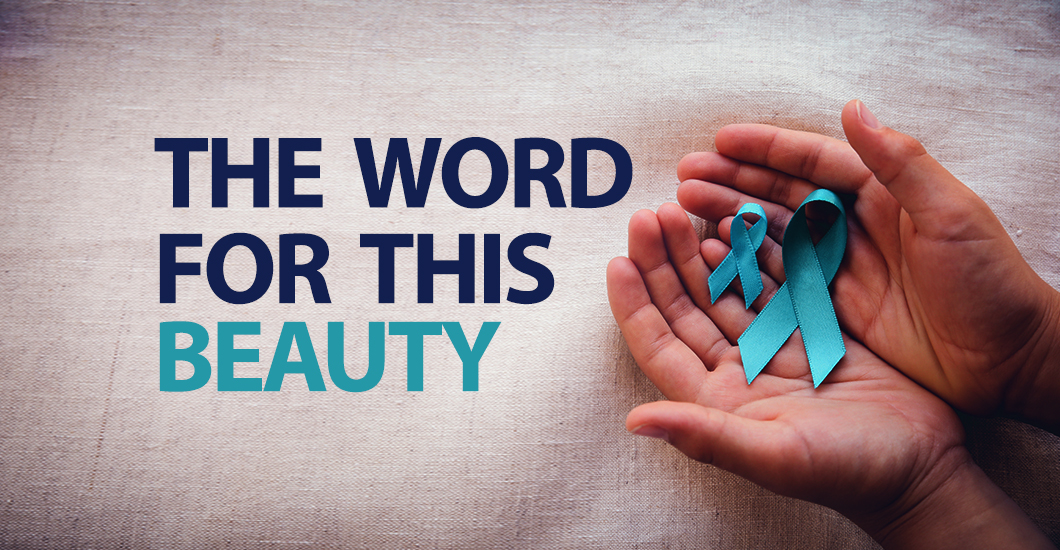
He knows every hair on our heads. I remember the first time I ran my fingers through my hair in the shower and a clump of hair fell out. From what I had heard growing up, growing some hair above your lip was pretty normal for a lot of women, but I did not know what to make of the hair growing out of my chin or the unpleasant sideburns that began cropping up on the side of my face.
I was diagnosed with Polycystic Ovarian Syndrome (PCOS) when I was fifteen years old and had not had a normal cycle in more than a year. Turns out, one in ten women are diagnosed with PCOS. My blood work results said my androgen levels were through the roof, and all I could see was myself feeling less and less like a woman. But what I could not see when I was fifteen was that I would be made whole through the “brokenness” of my body.
Starting at the age of fifteen, I began to believe the lie that my worth came from my body. As I grew up, that lie manifested itself in different ways—insecurity about my appearance, reliance on make-up to feel decent about myself, and feeling unlovable because of the possibility of being unable to bear children due to my PCOS. I threw myself into relationships with boys, hoping that I could make them like me, that maybe I could earn their love. Instead, I was left more and more empty until, in my emptiness, I was finally forced to face how I truly felt about myself. Even after I met our Holy one, I still struggled to accept this seemingly unacceptable part of myself. Heck, I still struggle today to love myself because of my PCOS. But at some point along the way, between the frustrated tears as yet another clump of hair fell out and the exhaustion of hoping against hope for a normal cycle after seven months of nothing—somewhere in between the fears and the loss and the pain—I found the truth.
The truth, which is so hard to accept some days, is that for some reason, because of some providential purpose, this is how our good Lord made me. Not only did He make with broken ovaries and jacked-up cycles, but He delights in me this way. He loves the hell out of this woman, her body, her past, present and future, and, most of all, her heart. That, my dear friends, is what I have been overlooking all of my life; I have been so busy trying to have this perfect body that does not belong to me that I have forgotten to strive for a more Christ-filled heart. I have been so overcome by my past mistakes and the ways I have found my identity in nothing more than my body that I have completely brushed past the unalienable goodness of my own heart. I have been so busy saying “I’m sorry” for all my imperfections that I have lost the ability to say “Thank you” for all my blessings.
Not long ago, a dear friend of mine prayed over me as I cried in anger, feeling as if I was drowning in my own waves. I will never forget what she told me: “Know that there is nothing wrong with you. Even your PCOS belongs to the Lord, and it’s time that you reclaim it for Him.” Too often we let the evil one use our “imperfections” to beat us down and we blame it on ourselves. For you it may be a physical condition, a vice or a fear, but whatever it is, no matter how overwhelming it may seem, our Jesus has already overcome. Whatever oceans you are sinking in, reclaim them for the one that “even the wind and seas obey” (Matthew 8:27). He “knows every hair on your head” (Luke 12:7), even the ones you have lost and even the ones that grow in places they are not supposed to. There is nothing wrong with you. He made you good and it is well, even if you do not believe that yet.
'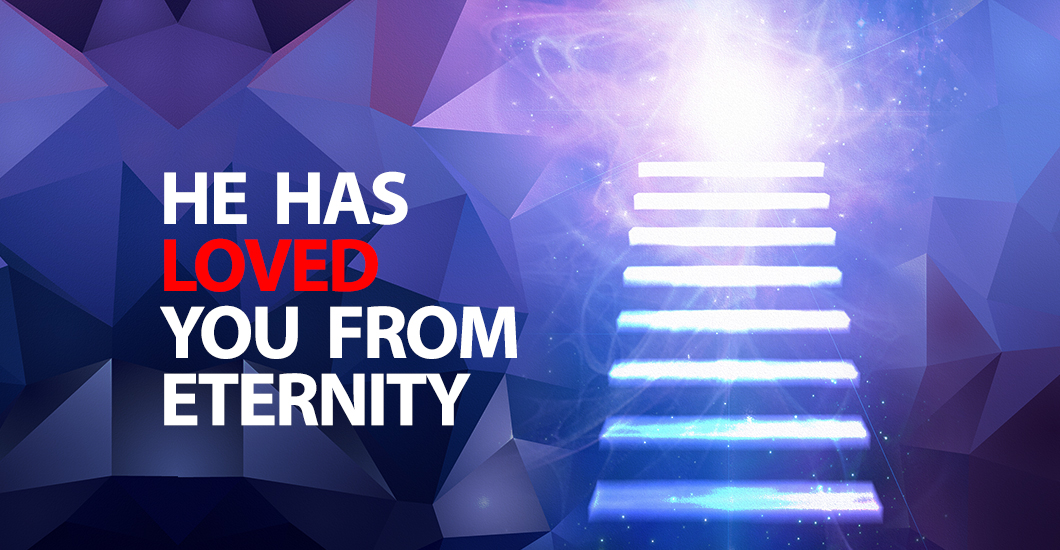
“And He said to her, ‘Daughter, your faith has made you well; go in peace and be healed of your affliction’” (Mark 5:34). This verse is the only example of Christ referring to anyone as His “daughter” in the Gospel of Mark. The woman with the issue of blood has become a daughter of the King through her faith. The gravity of this transformation could not be overstated! A woman in Jewish culture of the time was considered ritually unclean due to the blood that flowed from her body. She was isolated from her own people as they too would be considered unclean to come into contact with such a person.
The Gospel story has weighed heavy on my heart. What is it like to live as an outsider? The pain of her condition could not have been greater than the pain of the world’s rejection. Imagine also that her condition likely permitted no marriage or children. All the ordinary comforts of the world in terms of friendship and family were beyond her grasp. She was alone in the world. Having some means, she appeared to have applied all efforts to correct her condition and, having lost even her material comforts of wealth, she approached Our Lord, well … empty.
Few of us are unfamiliar with loneliness and loss. It is often our relationships that give color and energy to this life. Yet, the brokenness of relationships can bring an incomparable pain. Of all the catalysts that bring patients to my office, broken relationships are the most painful. Be it infidelity or conflict or loss, we are not creatures who do well alone. We mourn the lost friends and missing family members. We dwell on memories of closeness and grieve them over and over.
Into this pain the woman in Mark’s Gospel pushed through and grasped at the one and only relationship that would not fail. It was not her touch that healed her. It was not the garment that accomplished the act but her love for Him. She was drawn in and became forever His daughter! What was healed was not merely her flow of blood, but her truncated existence, her separation from life Himself. What she had mourned all those years had been given to her in perfect love, familial love! We are sons and daughters of the Father and we are loved! I know how hard this is to hold on to. How can the King love me? This is impossible to imagine especially when those earthly beings, who are supposed to love us, do not. When a parent abuses us, a long-cherished friend or child rejects us, we cannot imagine a God who is love. The face of God becomes distorted in our eyes.
Look to the woman in the gospel once more. Like us, she approached Our Lord from the back. She could not clearly see His face. Her loss and her loneliness did not prevent her from approaching her Lord, they propelled her toward Him. She saw Him with eyes of faith and this was enough. It is enough.
'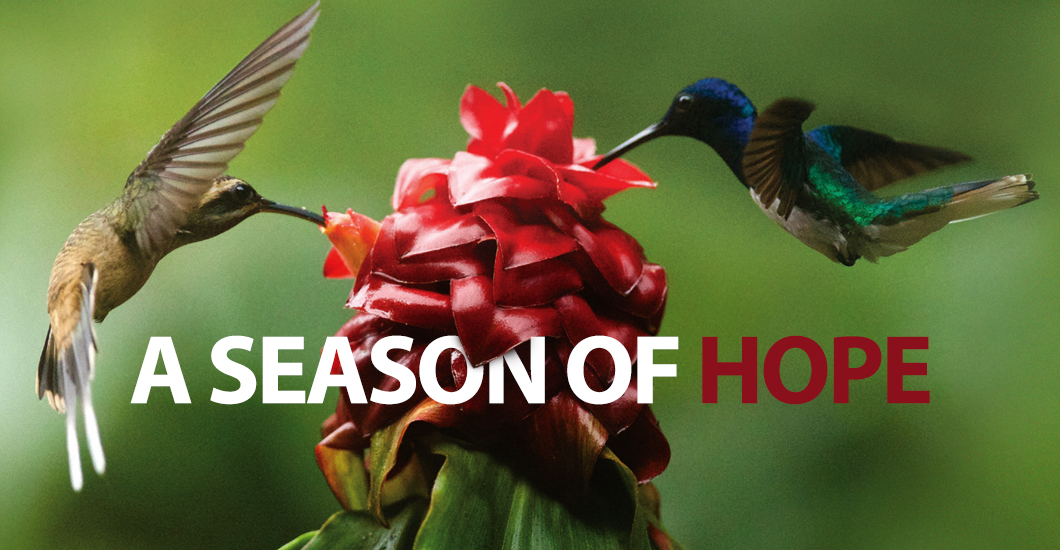
What has now been coined “Black Friday” usually marks the official beginning of the season called “Christmas Shopping.” This year I began getting online shopping notices a few days before Thanksgiving, then discovered that Black Friday was followed by Small Business Saturday and Cyber Monday. For many of us, I am afraid the weeks before Christmas are reduced to parties and hectic shopping.
It does not have to be that way. It should not be that way. In my family we have taken a different approach—we have rediscovered the season of Advent. The final weeks of ordinary time leading up to the Feast of Christ the King and the beginning of the Church’s New Year in the season of Advent can be a time of spiritual renewal. The readings and symbols of the liturgy point us toward those last things, those things of ultimate and eternal significance. It is the season where our prayer is, “Come, Lord Jesus. As You came in history, so come more fully into my life now and prepare for when You will come again at the end—at the end of my life—at the end of history.”
Hope: A Theological Virtue
Meditating on the coming of Christ should stir up hope within us. I am not thinking so much of the hope that is simply wishful thinking: I hope I do well on that test. I hope it does not rain on my fishing trip. I hope my sick mother gets better. I hope I get an iPhone for Christmas. No, the hope we are invited to grow in during Advent is the theological virtue of hope. The “Catechism of the Catholic Church” defines hope this way:
“Hope is the theological virtue by which we desire and await from God eternal life as our happiness, placing our trust in Christ’s promises and relying on the help of the grace of the Holy Spirit to merit it and to persevere to the end of our earthly life.”
Hope is a virtue, which means it is a habit or disposition. It is the habit of trusting in God and having confidence in God and His promises no matter what we see with our physical sight. As a theological virtue it concerns our relationship with God. Our relationship with God is founded in, lived in and expressed in hope. We relate to God in hope. Why? Because we cannot see God. We cannot see eternal life and we do not YET experience the fulfillment and happiness that awaits us with God.
Saint Paul says, “Though we do not see Him, we believe in Him, we trust in Him, and we are confident— hopeful—that He will guard what we have entrusted to Him until that day.”
Longing for Fulfillment
Christian hope concerns our longing for and expectation of fulfillment. We can all relate to the experience of feeling unfulfilled. In our personal lives we are not the people we hope to be. We wish we were more patient, more disciplined, more pure, more self-controlled, more disciplined, more faithful, more generous and more bold and courageous. In our relationships we long for more. We experience disappointment in our relationships, we feel let down, we wish there was there more unity, less strife. We wish our relationships were more selfless, less competitive. We long to be known completely and loved unconditionally.
Hope is the steadfast turning toward our true fulfillment, which is supernatural happiness in God. “Our hearts are restless until they rest in thee.” If we set our hope on anyone or anything other than God—even the best things in life, i.e., family, marriage, friendship—we will be disappointed, unsatisfied and unfulfilled. We will never in this life, on this side of death, on this side of heaven, find the fulfillment for which we long. This is why we need hope. If we understand that only in union with God will we find the happiness and fulfillment for which we were made and that we long for, we will pray ever more earnestly in this advent season: “Maranantha, Come Lord Jesus.”
'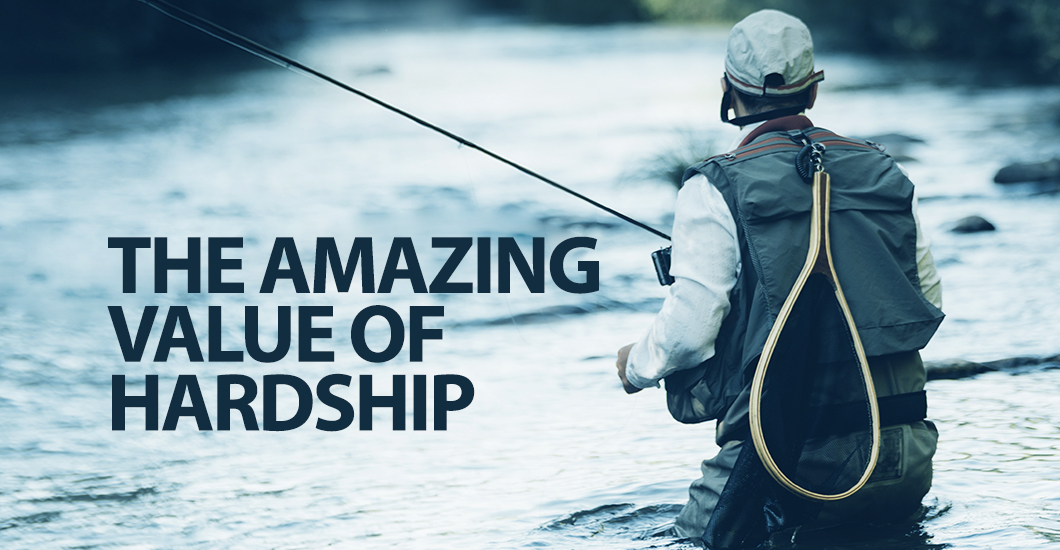
Hardship is not pleasant. It creates discomfort in our lives. It inconveniences our plans. It discourages us, causing hesitation and inaction. Yet, properly understood, hardship is one of the most valuable opportunities in the Christian life. It helps us grow in faith, personal maturity and intimacy with God. The opening verses of the gospel of Luke Chapter 5 capture almost every important insight for understanding the value of hardship, if we are willing to allow it to form us:
“[Jesus] saw two boats … the fishermen had disembarked and were washing their nets. Getting into one of the boats … he asked [Peter] to put out a short distance from the shore … After he had finished speaking [to the crowd], he said to Simon, “Put out into deep water and lower your nets for a catch.” Simon said in reply, “Master, we have worked hard all night and have caught nothing, but at your command I will lower the nets.” When they had done this, they caught a great number of fish and their nets were tearing … They… filled both boats so that they were in danger of sinking. When Simon Peter saw this, he fell at the knees of Jesus and said, “Depart from me, Lord, for I am a sinful man.” For astonishment at the catch of fish … seized him and all those with him … “(Luke 5:1-8).
Comfort
If your experience of boats is limited to luxury cruise liners, you might be under the impression that boats are comfortable. They are not. Especially if the boat is a firstcentury fishing boat. A long night of fishing consisted of bending over, hauling nets and sitting on narrow wooden seats, all while wearing wet clothes.
By the time Jesus gets around to speaking to Peter, the fishing is over and done. Peter is ashore, mending nets and cleaning up. Peter has had some time to stretch his sore muscles a bit, and he is certainly ready for some sleep after a long night on the water. Fishing is hard work and he is tired. Jesus, apparently unfazed by Peter’s fatigue and lack of a catch, looks at him and says, “Let’s go.”
This is the first of Peter’s three important decisions. He must choose between the comfort of his bed and the discomfort of the boat. Peter chooses discomfort. Peter references Jesus as “master,” implying that he does not yet have the revelation of Jesus as the Christ. The term “master” would apply to any wise teacher. Still, Peter chooses discomfort.
Convenience
It is one thing for Peter to let the rabbi teach from his boat. After all, Peter ends up with a front-row seat to listen to this master, to rub shoulders with the local “celebrity.” Jesus, though, is about to “up the ante” with Peter.
After teaching, Jesus basically says to Peter, “Hey, let’s go farther out and fish.” Peter, knowing that fishermen fish at night for a reason, may well have thought to himself, dismissively, “Carpenter’s son!” Jesus is proposing that Peter hit the reset button on the entire fishing operation. It takes time to row out to deep water, drop the nets, haul the nets back in, return to shore and mend the nets (again). If he is lucky, he might get an hour or two of sleep before he comes back to fish in the evening.
This is the second of Peter’s three important decisions. Jesus has interrupted the rhythm of Peter’s life. At first, the cost to Peter is small, maybe an hour or two of inconvenience. But, Jesus seems almost intent on making things downright difficult for him. Peter knows that his workday begins when the sun goes down and Jesus is asking for most of the daylight hours until then.
Peter chooses the harder path—again. He trusts a carpenter against his own knowledge and expertise and heads out to deep water. The payoff for Peter appears to be nothing more than a long day in the hot sun. Yet, he chooses inconvenience.
Cowardice
Peter drops his nets into the water and is confronted by a completely unforeseen issue that appears to threaten everything! As he hauls them in, they are so full of fish that he needs help from another boat. Luke tells us that both boats “were in danger of sinking.”
This seems perplexing. Peter’s obedience has brought a super-abundant, astonishing bounty. It is so abundant that the boats are in danger of sinking. Losing his boat would spell the end of his livelihood and maybe the end of his life. Peter must choose again.
He can start tossing fish out of the boat to lighten the load or even cut his own nets. Or, he can muster the courage to hang onto the full weight of God’s blessing. Peter chooses correctly for the third time. He risks everything for the fullness of the catch. Later in his ministry, Peter would need to know this lesson—increase comes at a price.
The Astonishing Nature of God
Luke recounts Peter’s response to the catch, which can be captured with a single word. Once again, Peter speaks directly to Jesus. Instead of calling Jesus “master,” Peter calls Him “Lord.” He glimpses the very divinity of Jesus, Son of Man and Son of God.
It should not be lost on us that, even to seasoned, experienced fishermen, this catch of fish was astonishing. The catch was so bountiful that the minds of the fishermen could not explain it rationally. It appears that the catch was not abundant, but actually “superabundant”; that is, defying logic, reason, knowledge and natural wisdom.
Understanding Hardship
The Christian understanding of hardship and suffering is intimately tied to evil and redemption. Hardship exists in the world because evil exists in the world. Sin, death, disease and trauma make life hard. These things do not originate from God. Because of His redemptive love, God is able to transform hardship into bounty. He is able to turn “less” into “more.”
Chapter 15 of John’s Gospel compares us to grape vines. Jesus tells the disciples in a pointed way that He prunes those who bear fruit (believers) so that they bear more fruit. Pruning, by definition, is the cutting away of that which is not necessary in order to promote new growth that produces more! And it is painful.
Leaning Into Hardship
In many circumstances in life, hardship is the very path to what we desire. If we listen in the way Peter did, Jesus will lead us through hardship to some kind of breakthrough, the greatest of which is a deeper, more intimate relationship with Him.
Hardship has the ability to push us beyond ourselves. It helps to forge the dimensions of our character that can only emerge through difficulty. Comfort, convenience and cowardice keep us from a life that is fully alive in Christ. Discomfort, inconvenience and courage form the real substance of our “yes” to Christ. They allow us to see Jesus for who He is and—like Peter—to say “Lord.”
'
“I stopped reading fiction when I became Catholic.” The woman talking to me was obviously serious, but I could not believe my ears. What a crime! What a shame! What a sad state of affairs! Yet, I did not express my sorrow. After all, we were at a conference about honoring God with your sexuality and there was no need to ask why she had stopped reading fiction. She had obviously figured out that chastity has to do with purity of mind— not just purity of body—and she was trying to cleanse her mind of “any worthless, evil or distracting thoughts,” as an old prayer phrased it.
Maybe she had a point. Novels and stories fill our minds and affect the way we think and act. A good novel inspires things like bravery, courage and self-sacrifice. A bad novel inspires lust and violence because that is what sells. Books do not have a rating system like movies, but words can paint pictures. Some books tell our hearts that loving someone means about the same thing as craving a chocolate brownie smothered in ice cream and drowning in hot fudge.
There are good reasons to be careful about what you read, but does that mean mysteries, adventures and romances are out because they are all bad for you? Fortunately, the answer is no. As with movies, you just have to be selective. Reading a book should be enjoyable but it will shape how you think, so pick novels that will help you envision who you want to be. Living vicariously through a character can train your heart, in reality, to react like the character. Listening to a character’s struggles can allow your mind to sort through an issue. Learning from a character’s mistakes can help you avoid disaster in your personal life. Looking carefully at a character’s life can help you see more clearly what leads to chastity and what does not. As much as some novels can create a lot of impure thoughts, others can fill your mind with thoughts of noble love.
I recently heard from a man in his early 30s who also had not read much fiction since he became a Christian. He wrote, “I have so much to write about how your book relates to my life and my relationship … Your story has helped me see suffering in a different way and helped remind me that Christ made the ultimate sacrifice … I thought a lot about life. I also find myself saying more, little random prayers throughout the day, which I never really did before.” Was he reading the Bible? No, a novel. As with all good novels, “I felt happy, then sad, then nervous and then happy again … [At one point] I felt so much anger inside and then I remembered, ‘It’s only a book.’”
Do not give up on fiction. Ask friends for suggestions. Search the web for Christian publishing companies and suggested reading lists. Look for old classics on the library shelf. A good book can help you reset your vision and your life. An inspiring novel will guide your mind and your heart toward goodness, beauty and, yes, chastity. Plus, getting lost in a story is a lot more fun than staring at the walls!
'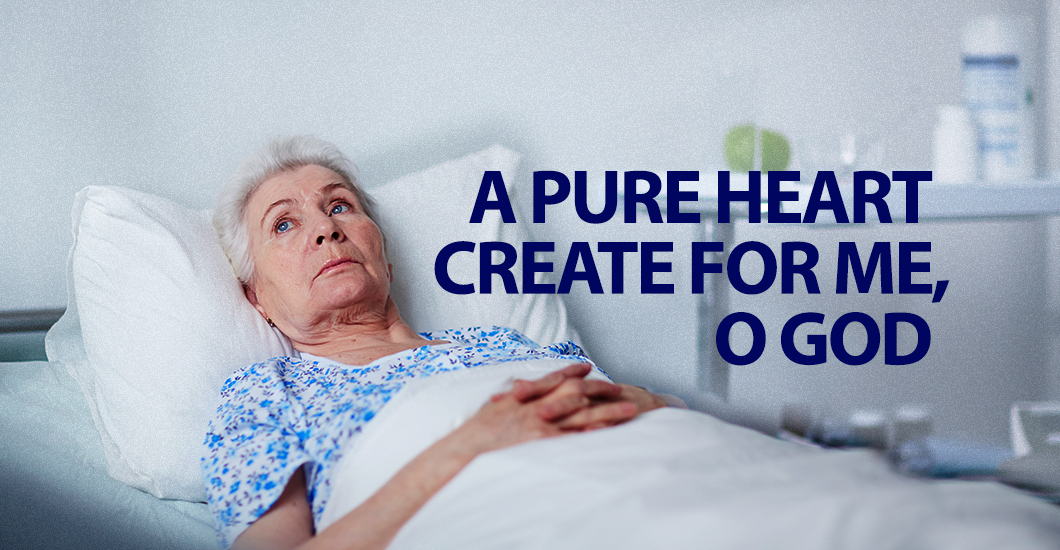
A frail, sick, elderly woman lay on her bed. Deep lines of pain and sorrow were etched on her thin face. Her dark wavy hair glistened in the evening sunlight, highlighting the odd strands of grey weaved through her tangled and tossed strands. She moaned and spoke in hushed tones, barely able to annunciate her words. Her left arm was discolored, swollen and bore an open ulcer that rested on urine-soaked sheets and her shoulder was dislocated. A stale smell of urine permeated the heavy and oppressive air. Her special needs son lay on the living room couch asleep and intoxicated, unable to care for his mother.
Shocked to see the condition this unfortunate woman was in, my helper, Mario, and I set out to alleviate her distress as we gasped for fresh air. We slowly moved her to a chair, changed and washed her and discarded the soggy, stained bedclothes and mattress. Mila and her son Kruno had been living in the new house a mere three months when she suffered a stroke. “Dearest Mother, what are we going to do with this poor soul?” I implored. Her pitiably and miserable state had permeated the deepest part of my heart and I was filled with sorrow for her. With several years of humanitarian work behind me at this point, I had adjusted to the harsh reality of suffering. I had struggled to find the presence of God in the mass ethnic cleansing, sickness, pain and poverty of those living on the margins of society, those who had once lived in comfortable homes dotted across scenic and idyllic parts of Bosnia-Herzegovina.
I was spoon feeding Mila, encouraging her to eat some scrambled egg. Disinterested in eating she turned the food around in her mouth several times and swallowed hard. The scene reminded me of the parable of Lazarus and the rich man. I had everything in life, a beautiful home, youth and health to my advantage, a monthly salary; I began to thank the Lord for all that I was blessed to have. I caressed Mila’s wrinkled face and lifted her hand to my lips to kiss it. She raised her head, made eye contact with me and gave a little smile. My heart melted and tears flowed down my face as a burning feeling rose up in my heart. I had never experienced this feeling before. My heart filled with tender love for this poor soul. I wanted her to know that she was loved and cared for, albeit by two strangers, one who spoke in a foreign language and the other, a tall Croatian man who sang love songs to her in her native language. Her sunken eyes grew a little brighter as we placed her back in a clean, dry bed and propped her up with pillows, assuring her we would be back the next day.
We kept our promise and arrived properly equipped this time with food, medicines, extra bedclothes and disposables. We found Mila in the same position and in a similar condition as the previous evening. Repeating the process, we tried to convince her to let us take her to the hospital, but she refused point blank. It was an unnegotiable position. Her hands and feet had not been cared for or cleaned in a long time. Her nails were long, with dirt gouged under them, and her skin was dry and hard. Mario agreed to clean her hands and I began cleaning her feet and nails as we waited for the doctor to arrive.
I had grown up on a farm and had fed and looked after the small animals for many years. My siblings and I had chased each other with long worms that we pulled from the soil as my father cultivated the vegetable garden. I had prepared the cow barns, cleaned out the hen house and was well accustomed to farmyard odors. I had since discovered that my ability to deal with dirt, foul smells and impoverished circumstances was no longer there. My stomach wrenched and I tended to pull away. This time, though, I could not as I held Mila’s wrinkled foot in my hand. “Oh Holy Mother, give me the strength to do this work,” I invoked as I prayed silent Hail Marys. I cleaned underneath her toenails and pulled out dead bed bugs. I took deep breaths and continued to pray and then the burning sensation of fire filled my heart, purifying it. “Bless the Lord,” I prayed “Bless His Holy Name.” The flame continued until I finished my work. I kissed my “Lady Lazarus” on her forehead and cheeks and we left Mila to sleep in comfort.
I never saw Mila again. She died in her sleep after I returned to Ireland, having left her in better, reliable care. One morning while going back after the Holy mass, I received the news from Mario that Mila had passed away. The Gospel of the day was the parable of Lazarus and the Rich Man. I smiled knowing that God, through his tender love and mercy, had allowed me the gift of knowing Mila, and through it had freed me from my irrational fears. He had opened my heart to love and care for His poor the way He would want me to do. From that day forward I was given the grace to embrace the most profound physically and mentally disabled people with a love that could only have come from God.
Praise be to Jesus and Mary.
'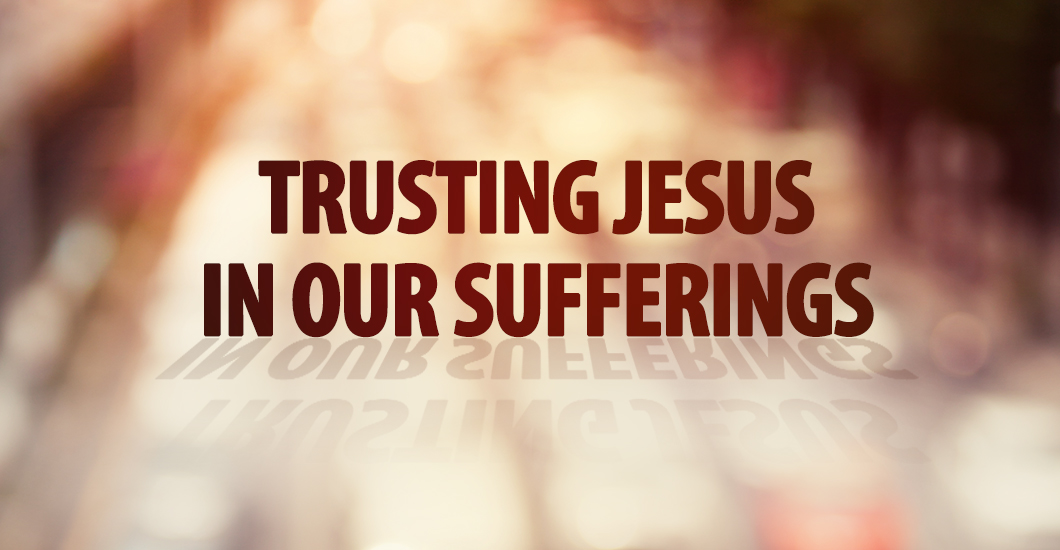
Most of us are regular church attendees and we participate in church-related and spiritual activities. Nevertheless, how well do we know the Lord whom we worship? We say with our tongue that He is almighty, powerful, gracious, loving, caring and so forth. But when we face an adverse situation in life, how do we react? Do we get anxious? Do we feel like God does not care? Do we get angry and frustrated towards God? Does it feel like He has abandoned us?
I believe the reaction we generate when we face a difficult situation will help us realize exactly how much we trust Him. In any relationship, how much we trust a person depends on how well we know that person. The more time we spend with that individual, the more we begin to learn about that individual’s character, including his or her strengths, weaknesses, likes, dislikes and so on. Our understanding of that person’s character helps us to determine how much we can trust that individual.
Just like that, how well we know our Savior can play a significant role in evaluating how much we trust Him. In order to understand our Lord’s character, we need to spend more and more time with Him. It is crucial for us to meditate on the things that He had to give up in order to come down to earth and become like one of His creations. Think about it: the God who created heaven and earth, the God who is full of glory and honor decided to shrink into our likeness so that He can endure all the trials and difficulties of the earthly life that His sons and daughters experience. Furthermore, we need to contemplate the painful and most humiliating punishment He had taken upon Himself so that we would be saved from the eternal punishment we deserve.
If we are measuring God’s love based on the materialistic blessings He has given us in this world, we will be disappointed and angry at God when we do not receive those things or when we lose them. On the other hand, if we realize the value of our soul and learn to understand His love based on the great sacrifice He has made for us to redeem our souls, then we begin to understand how much He loves us. Dear readers, Jesus loved you so much that He was willing to leave everything behind and come down to this earth and accept a painful death for our salvation. He shed even the last drop of His blood to redeem us. Because of that sacrifice, you and I have been granted access into Heaven.
It is also important to remember that God is our Creator and He loves us more than anyone else in this world. We do not like anything bad happening to our loved ones. We will not deliberately do or allow something to happen in our loved ones’ lives that would harm or destroy them. Considering that we—weak and sinful beings—would not want anything awful to happen to our dear ones, do you think our heavenly Father, the God who created us, would allow something to happen in our lives that would harm us? He will not. It is not in His character to do anything to hurt His children. He is love in its fullness. If God has allowed an unpleasant situation to happen in our lives, He has a great and good purpose behind it.
Many of us likely have heard this analogy: if one of our children has to go through a painful medical procedure in order to recover from a life-threatening illness, we would allow them to go through that process— no matter how painful it is to see our child suffering. That child may be crying and begging you not to let him go through that process. However, since you know that it is necessary in order to sustain his life, you would allow him to go through it with a heavy heart. Just like that, our heavenly Father is not rejoicing when we are going through hardships. His heart is heavy and sad when He sees His children suffer. But sometimes, He has let us go through certain sufferings in life to sustain our precious soul. He knows that if He does not allow us to experience certain adversities that our soul will forever be lost.
As an individual who lost her sight in a car accident, I truly believe this suffering that He allowed has been the greatest blessing in my life. In spite of the difficulties and challenges I face as a blind person, I am able to see this physical impairment as a blessing because this blindness has become a great eye-opener for me. Because of this condition, God gave me the grace not only to realize the value of my soul, but also to see how much I am loved by Him. When you come to realize these truths, it will become easier to carry the crosses that God has allowed in your own life.
In 2 Corinthians 4:17, Saint Paul says, “For our light and momentary troubles are achieving for us an eternal glory that far outweighs them all. So we fix our eyes not on what is seen, but on what is unseen. For what is seen is temporary, but what is unseen is eternal.” Like Paul reminds us, make every effort to concentrate on that eternal glory that is waiting for us in Heaven. Let us shift our focus away from our trials and tribulations which are temporary and, instead, put our focus and trust in a loving God who is much, much bigger than any storms we face in our lives. Always remember that our God can turn any tragedy into a great victory when we put our hope and trust in Him.
'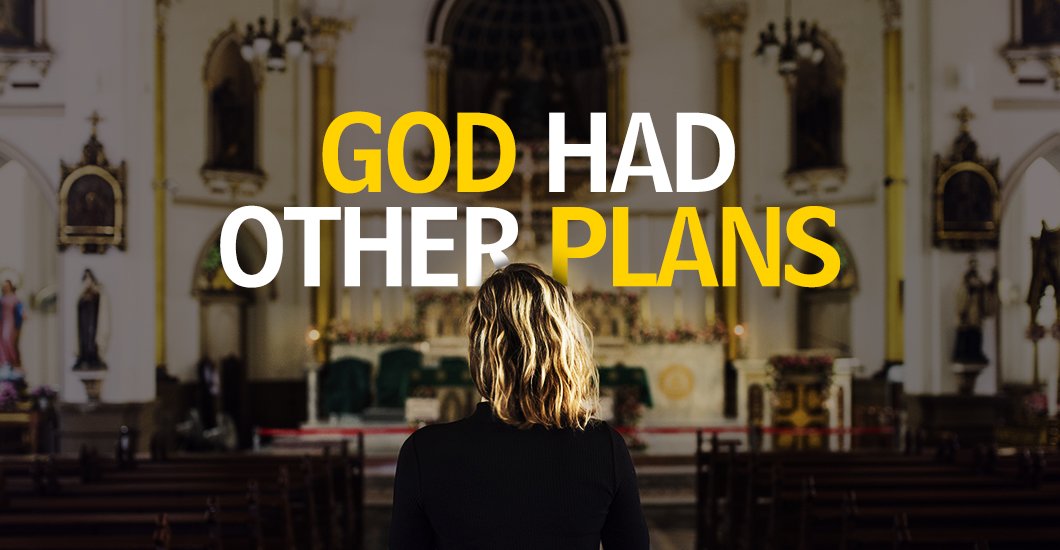
My conversion to the Catholic Church took about three seconds. I was an arrogant fool sitting in on my very first Mass and watching it like I had watched a National Geographic nature film. I was analyzing away—“Those pews are so phallic, who are they kidding that this isn’t all about a patriarchy?”—when I heard something Jewish. A cantor sang the Psalm. It caught my attention and stopped the haughty drift of my thoughts. I began to be interested. What else might they have stolen from the Jews?
This led to other discoveries, like the parading of the Gospels. “Well, if Jesus does claim to be the Jewish Messiah, I guess there should be Jewish elements in the worship,” I thought dismissively until it occurred to me I had never seen Jewish elements in the Protestant churches I had attended as a girl. Why not? I puzzled that one for a while.
About the time for the consecration (I had no idea what it was called at the time), I had come all the way around to the skeptical thought, actually accompanied by a quiet sarcasm-laden snort, “What if all this were true?”
Then I was hit in the head with a 2 x 4—that process took all of three seconds. I say that comically but wave upon wave of revelation breaking over my stunned mind was actually very painful. It was also beautiful, exquisite and utterly horrifying. I saw things, felt things, all in quick succession with the complete clarity of the words, “It is all true,” ringing like a bell.
Then an actual bell rang signaling the consecration. Jesus Himself was upon that altar and I was done. I had a choice to make and it was my very last chance. It was true. I could never again deny the truth of it but I could still deny Him. A ‘yes’ would cost me every friend I had, the community I had built, my reputation. Everything. Was I willing to give it all up? Oh, God, yes!
Then I came back from that heady place to reality where the Mass continued before me. I was Catholic now but that priest up there on the dais was the first one I had ever been in the same room with. I was Catholic now, but my husband was not. What now? I was Catholic, but I had no idea what that meant. I decided to start with the little pamphlet my husband had given me on a whim as we walked past a display on the way into the church. It was on the rosary. As I read through the mysteries all I remembered of the life of Jesus came back to me. Then I came upon the Assumption.
“The Assumption?” I thought, “What the hell is that?” (The conversion of my heart was won; my conversion of behavior was incremental).
The Mass ended. It was a daily Mass so there was not a crowd. The priest was at the back of the church talking with a woman. They both greeted my husband and me warmly, the priest asking a few questions of the new people. He quickly discovered my husband was an ex- Catholic and I was not anything I was willing to own up to publicly yet. I said I wanted to join the Catholic Church and shot a guilty look at my husband. I knew it was not nice to tell him like this, but I did not have the guts to face him all at once. Maybe he could get over the initial reaction and be polite by the time we got to the car.
Then I blurted out my question before I lost my nerve and before the polite chit chat wound down. “What’s an Assumption?” “The Assumption?” the priest looked surprised. He gave an answer too small to satisfy my hunger, “It was when Our Lady was taken to heaven to reign as Queen Mother.”
I pressed for more information and he asked me to make an appointment. I was there the next day and in RCIA by the end of the week. I was a thorn in that program’s side. I read book after book and, completely ignorant, each question generated more questions. I took to carrying a notebook to jot them in. People would actually groan when at the end of the RCIA class my hand would go up when they asked, “Are there any questions?” I had pages full.
Somebody in heaven took pity on my classmates and drew my attention to a bumper sticker with the local Catholic radio station on it. I tuned in my dial and there I found the depth and breadth I craved.
My husband was kinder than I knew. He had been uncomfortable with the direction our spiritual life had taken us and was relieved to come home to the faith. He joined a Landings Group and began his own Catechesis. Meanwhile, my conversion was a big secret from my family and friends. There were two reasons for this: my family and my friends.
My family was Church of Christ. While it was never spoken of from the pulpit, growing up the handouts available on the tables in the vestibule often held tracts that spouted things like the Catholic Church was the whore of Babylon and the Pope was the Anti-Christ. A few people in the church had family members convert to Catholicism. This news was greeted in the same manner as people whose family members had come down with cancer: with condolences, disbelief, and shocked horror. Although my mother and father made it clear they did not approve of the tracts, neither did they approve of Catholics and their beliefs. I grew up with the impression that they were a strange cult, like the Moonies.
My friends were an entirely different matter. They loathed Christians, especially Catholics. One had told the story of her son accompanying her to visit her mother at a senior facility. Some little old ladies in the lobby had made semi-rude gossipy comments about them as they walked past. The little boy got on the elevator, rolled his eyes and said, “Probably Christians.” His mother laughed as she told that story, as did everyone present; I did not. As far from Christianity as I was, I thought she was training a bigot and that is never funny.
I told one friend what was happening with me. She was pretty neutral except that she was worried how it would change the dynamics of our relationship. We still loosely keep in touch. The others were a different story. I announced my conversion and endured tears, anger and, finally, a scathing acceptance of my truth. I had lost all credibility and, in their eyes, any claim to intelligence. After a few abortive attempts, all contact with that group of friends was lost. No one would return my calls or even my Seasons Greetings cards. Finally, after a few years I just started sending Christmas cards thinking what could lose? One responded and now we exchange biannual letters. The others dumped me because they could not be friends with someone like me—an “intolerant Catholic.”
Hard to believe an average bunch of gals could be so anti-Catholic in this day and age? Not in the New Age. We were actually a group of goddess-worshiping pagans and I was a priestess. I was a leader in the community. I taught classes, wrote songs, and led rituals, the whole shebang. For those of you who do not believe in these sorts of things, I was able to do all sorts of unbelievable things, like mild prognostication and other creepy stuff. The allure of these “gifts” is such that I will not go into details. Suffice it to say, my group was astonished that anyone would be willing to give up such power.
Now that I am free, it amazes me how enslaved I was to it all. I did not see myself as worshiping the devil or demons, I just thought I had found a legitimate power source. I was amazed at the “miracles” I could perform. I was heady with it. The power is the bait. It hooks you and then turns on you. The people involved stagnate and become trapped into continually cycling through personal issues. It is similar to the stagnation of the personality caused by alcohol and drug abuse and the experience is very much like an addiction. With this much personal dysfunction, the groups can get ugly. One of the most chilling comments during my confession to my group was from the group leader, “There’s a reason we used to kill oath breakers.” She did not mean our group in particular but the groups in the largely recreated neopagan past. Her reference was historically dubious but I was so glad to dust myself off and move on in my life.
I found myself filling my days not with the chatter of friends but the chatter of Catholic radio. It was a lonely but wonderful time. I was discovering things and growing as a person in ways I never could have imagined. My husband was also undergoing a transformation. Our marriage had never been better. Incrementally, I was learning just how self-centered and sinful I was. I was also learning how much I was loved. All my life I had yearned for something unknown. Now I knew what that was, and I had that something.
In the midst of this, I told my parents. They were not pleased but they were not condemning either. They said they would tell the rest of the family for me, meaning aunts and uncles. It was their way to spare everyone any unkindness or awkwardness stemming from the initial shock. Then my parents said something that surprised me: “This will be good for your family.”
That they found some good in my conversion was an incredible surprise at the time. Of the two groups, family versus friends, I had expected the opposite reactions. I had feared that my family would disown me and expected my friends to work out a new relationship with me. Exactly the opposite occurred. I was disowned by my friends, but my family and I have worked things out.
Why did I visit that church that day? Like any convert, I was looking for something and found more than I bargained for. I was considering attending the Catholic Church because I wanted a community large enough to hide myself in. I wanted respectability without having to actually be respectable. In a sense, cafeteria Catholics evangelized me. I walked in that door thinking I would go to the cafeteria to pick and choose what I wanted from the table and I would remain unchanged. God had other plans.
'